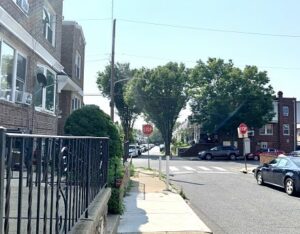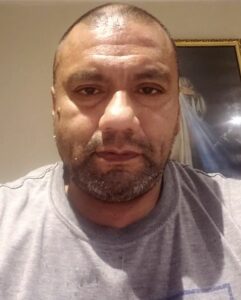Jesenia Calderon knew foul practices polluted Philadelphia’s justice system years before Philly’s District Attorneys Office released an unusual report in June 2021 that decried injustices arising from official misconduct by prosecutors and police.
The insights into injustice held by Calderon, a nurse and military veteran, come from decades of seeing her father victimized by prosecutors, police, judges and others.
Jesenia’s father, Dennis, was wrongfully convicted, imprisoned, then deported to a South American country over 3,500-miles from Philadelphia.
“My father’s case is proof of how corrupt the system is. He never received a fair shake,” Jesenia Calderon said during a recent interview.

The injustice endured by Dennis Calderon and his cousin, Julio Maldonado, is all too typical of Philadelphia’s history of outrageous injustices polluted by racism.
A mob of racism spewing whites attacked Calderon and Maldonado in August 1996. But Philadelphia authorities charged the pair with attacking the racists.
Authorities refused to arrest the racists who initiated the attack on the Latinos. Those persons began the attack with a barrage of beer bottles. Authorities also refused to arrest the persons who pummeled the two Latinos with fists, feet, and knives despite prosecution witnesses naming those culprits in court.
Authorities convicted Calderon for bashing a young white man with a baseball bat. But no medical evidence documented any baseball bat injuries anywhere on the body of that young man, Christian Saladino.
Dennis Calderon denied bashing anyone during that racism-fueled incident. Calderon said he grabbed the bat merely to scare off those attacking Maldonado and those persons threatening to attack his home where his family huddled.
Calderon received knife wounds during that attack.
Maldonado said he grabbed a ‘Club’ anti-car-theft device to free Calderon from a battering by three men. He admits “grazing” the shoulder of the person he saw stabbing Calderon with that ‘Club’ device.
Prosecutors, however, declared Maldonado smashed Saladino’s head. But no medical evidence documented any head injuries from a ‘Club’ to Saladino.
Prosecutors described Saladino as an “innocent bystander” not involved in the attack on Calderon and Maldonado. Yet, those who attacked the Latinos were friends of Saladino, who he was drinking beers with before the attack, according to trial testimony.
Saladino, collapsed at the attack scene and was left permanently disabled, unable to care for himself. Paramedics who treated Saladino at the scene thought he was drunk or on drugs since those first responders saw no signs of brunt force trauma anywhere on the young man.
Calderon and Maldonado said those metal objects were used for self-defense against the mob that outnumbered them. But prosecutors rejected self-defense.
Prosecutors proclaimed the Latinos engaged in criminal conduct because they employed weapons against the violent but unarmed attackers. Prosecutors said the pair should have awaited police. Yet police didn’t arrive on scene until nearly thirty-minutes after the first 911 calls about that mob attack, according to official records.

Prosecutors convicted Calderon and Maldonado through testimony of professed eyewitnesses whose court testimony was contradictory and implausible. Two key eyewitnesses, for example, testified they clearly saw the Latinos bash Saladino while they watched the 12:30 a.m. attack through darkness from farther away than a football field – which is 100-yards long. Those witnesses declared neither a row of parked cars nor trees between them and the attack site obstructed their night-dimmed view in anyway.
A 1997 conviction led to Dennis Calderon and Maldonado, spending years in various prisons before deportation to Peru, the country the two men left as toddlers. Although this pair lived legally in America, federal authorities deported them for that conviction since they were not official U.S. citizens.
In a bizarre twist on the typical Philadelphia pattern of white authorities minimizing racist misconduct, the prosecutor during that 1997 trial and the judge who convicted the Latinos during that non-jury trial, were both African American.
The prosecutor who won convictions against Calderon and Maldonado – Seth Williams – later achieved ‘Firsts’ of fame and infamy.
Williams became the first African American elected District Attorney in Philadelphia’s history. Williams then became the first DA in Philadelphia history imprisoned for corruption that included misappropriating money from his mother who was infirmed in a nursing home.
***
Jesenia Calderon was five years old when Philadelphia police arrested her father outside their home in Northeast Philadelphia after that attack by racists around 12:30 a.m. on August 4, 1996. The Calderon’s were the only Latino family living in the area. Dennis Calderon said drunken attackers cursed him for living in ‘their’ community.
Jesenia Calderon said, “We’re suffering the consequences of this injustice every day,” referencing her mother, younger brother, and other family members.
The judge that convicted Calderon and Maldonado – Gregory Smith – voided his 1997 guilty verdict two years later, citing evidence of innocence presented during an appeal. An examination by a forensic pathologist after the ’97 conviction linked Saladino’s injuries to his rare blood condition. That pathologist’s report stated Saladino’s injuries were not from “being struck by an instrument/weapon.”
Prosecutors had medical reports referencing Saladino’s rare blood condition before they prosecuted Calderon and Maldonado for causing his injuries. Yet, during that 1997 assault trial, prosecutor Williams and trial judge Smith both discounted those medical reports, according to the trial transcripts.
When Saladino died in 1998, prosecutors charged Calderon and Maldonado with murder – linking his death to the 1996 incident. The murder trial jury quickly acquitted the pair due largely to that forensic pathologist’s findings.
Philadelphia prosecutors fought successfully to reinstate that 1997 assault conviction voided by Smith. That reinstatement effort and other actions, some argue, evidenced what that June 2021 DA Office report condemned as the “win-at-all-cost culture” that drove too many Philadelphia prosecutors in the past.
Federal authorities deported Dennis Calderon in 2009, the same year Jesenia graduated from high school. After Calderon and Maldonado served two-plus years in Pennsylvania prison for that 1997 conviction and while successfully serving parole, federal agents placed them in immigration prison where they languished four-years before deportation.
The ordeal of Dennis Calderon and Julio Maldonado exposes “so many wrongdoers on so many levels” said immigration lawyer David Bennion, Executive Director of the Free Migration Project. Bennion is one of the lawyers working to end the exile of Calderon and Maldonado.
“This is a case study of how the courts and ‘the system’ worked together to punish these guys,” Bennion said. “It makes no sense.”
***
Dennis Calderon lives in Lima, Peru, far from his wife, daughter, son, and other close family members. Calderon keeps in touch with his family through WhatsApp and Zoom but painfully misses real-time/real-touch contact. His wife and children have visited him Peru.
Although Calderon worked three jobs in Philadelphia when arrested – one full-time and two parttime – his status as a foreigner in Peru and his lack of fluency in Spanish makes employment difficult.
“The only jobs I can get here are not well paying,” Calderon said during a recent Zoom interview from Peru. Calderon lives near Maldonado in Lima.
Calderon lost the Northeast Philadelphia home he and his wife used their retirement funds to purchase. Threats by racists to firebomb the house and harm the family forced them to flee.
“Out of everything, what hurts the most is what they took from me. They took my kids! They ruined our lives,” Calderon said.
Like Calderon, Maldonado’s adjustment to Peru has been difficult. Maldonado lost his budding career as a chef in New York city where he lived. Maldonado also lost his fiancée following his 1996 arrest. Maldonado came to Philadelphia that August for a quick visit with family members. He stopped by to see Calderon’s new home shortly before the racist attack.

“I’m still shocked that this has gone this far,” Maldonado said during a recent Zoom interview from Lima. “This nightmare has gone on too long.”
Family members of Calderon and Maldonado also carry a weight from their plight.
Maria Calderon, Dennis’ sister, said her life’s been consumed with clearing the injustice that has snatched her brother and cousin away.
“This injustice has severely affected me mentally,” Maria, said.
Maria Calderon has thoroughly investigated the case, uncovering additional improprieties.
“Even the guy who threatened to firebomb Dennis’ house wasn’t arrested,” she noted.
***
Jesenia Calderon and her brother, Desmond, have both written poignant pleas to federal authorities begging for their father’s return.
Desmond Calderon sent a 2019 letter to immigration authorities noting his current service in the U.S. military.
“The bitter irony is that I fight for a country, whose judicial system has wronged my family terribly,” Desmond Calderon’s letter stated, pleading for his father’s return. “My father was convicted of a crime he did not commit…”
